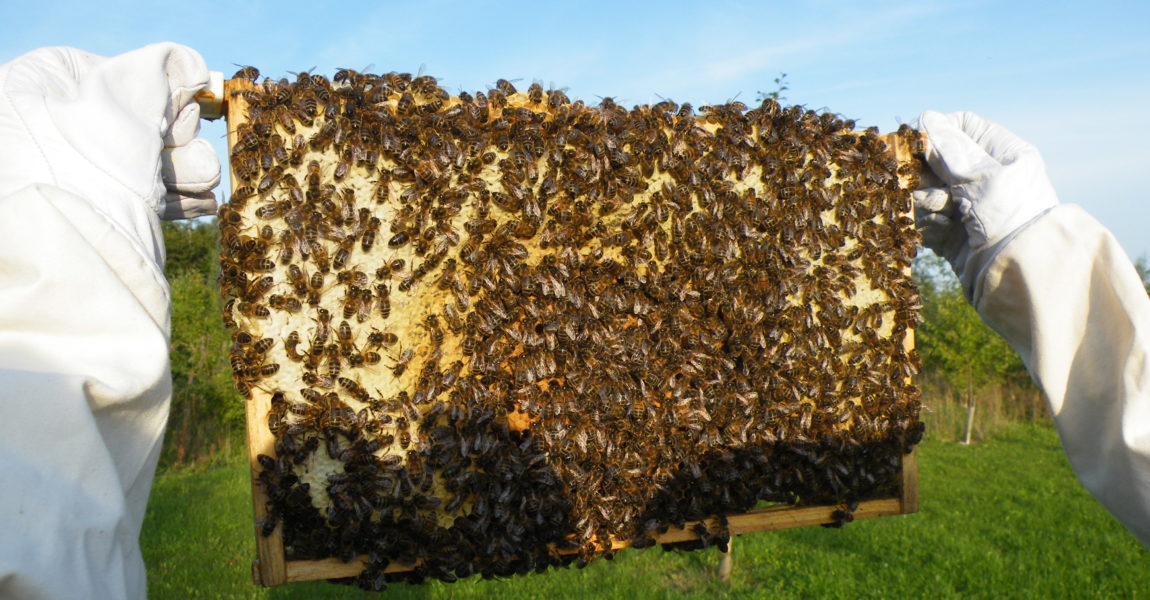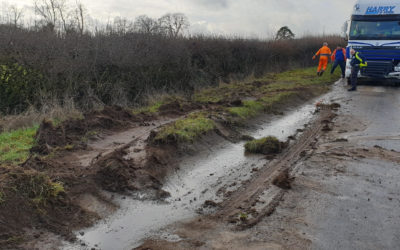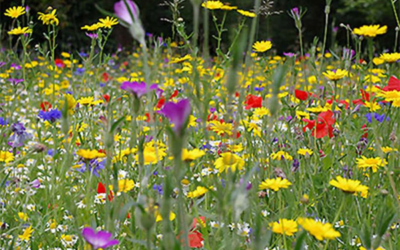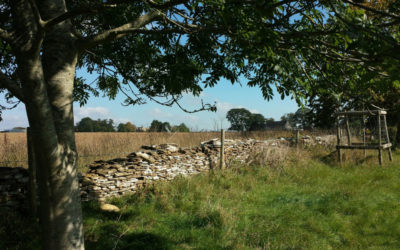
Honey Bees & Beekeeping by JAMES SHRIVES, Larkhill Cottages
The honey bee colony is a true gynaecocracy – dominated by females – the males that do exist within a hive are booted out at the end of the season as they are then surplus to requirements and the precious food reserves that have been gathered, and are needed to support the colony over winter, cannot be wasted on the idle!
I always thought beekeeping rather an eccentric pursuit, practised by monks and retirees, but hey, that was six years ago and now I am committed. I suppose the idea of being able to produce a few jars of “home grown” honey was an exciting prospect. We bought a flat pack hive and ordered a starter colony (nucleus) of honey bees from a commercial apiary near Gloucester which we collected in the boot of our car and with a bit of help from YouTube successfully transferred these into their new home. The truth is, the longer you do it the more surprising and rewarding it becomes and like most things in life, the more you know the more there is to know.
A full colony of bees will comprise upwards of 50,000 individuals but fascinatingly all working for a common aim. What appears as chaos, even to the trained eye, is in fact an organised highly complex society and it is the job of the beekeeper to try and understand and work with the bees to ensure their health and well-being, to maintain a strong colony, and hopefully obtain a honey crop. It can be a very rewarding hobby putting one very much in touch with the seasons and weather conditions and available forage which the bees can feed on. It can also be very frustrating as just as you think you understand the bees and what they are planning to do next, they have a habit of confounding your misplaced confidence and doing something entirely unexpected.
The honey bee is thought to have originated in tropical areas but has adapted to almost all areas of the world. In the northern climate they have to deal with a relatively short feeding period of summer so in the UK we see a dramatic and rapid increase in the population to collect as much in the way of food stores as they can. During spring the Queen can lay between 1,500 – 3,000 eggs each day, and it is at this time that the beekeeper has to be most attentive to try and avert the possibility of swarms. The Queen’s eggs are “parthenogenetic” meaning that they will develop whether fertilised or not. Non fertilised eggs become males or “drones” – who have no male parent but they do have a grandfather! The fertilised eggs become worker bees and are all female and during the summer will live just 36 days and collect honey for 15 of those. The Queen will live for 3 – 4 years.
Worker bees returning to the hive will communicate the whereabouts and distance of a good source of forage to other bees within the hive and do so through a series of moves known as the “waggle dance” using the sun as a reference point. Of course the sun is moving all the while and the returning bee will make an allowance for the lapse of time between flying home and dancing it’s directional message – how amazing is that?!
We currently have 5 hives which can expand during the active season and we have had as many as 10. A walk around the apiary on a late summers evening can be compared to standing next to an electricity substation as each hive gives of a low throbbing hum of activity. When inspecting the bees, done weekly during the active season, you never quite know the reception you are going to get and there is often a moment of anxiety before lifting the lid as the gentle hum of tens of thousands of bees turns into a roar. If they don’t want you to be there they can be pretty tetchy and at times like these we take comfort in our (almost) bee proof suits.
Many people will consider that bee keeping is purely a rural pursuit but in this day and age of monocrop agriculture, towns and cities with their array of gardens can have a richer and longer season of flowers on which the bees can forage. Each crop of honey will be different in taste and texture from the last (unless it is a supermarket mass blend) as the character is influenced directly by the flowers the bees have been feeding on – that is exciting in itself.
Regulations dictate that honey for sale should carry a sell by date but when one considers that edible pots of honey have been found in the tombs of the Pharaohs in Ancient Egypt, you probably don’t have to adhere to that date too closely!



